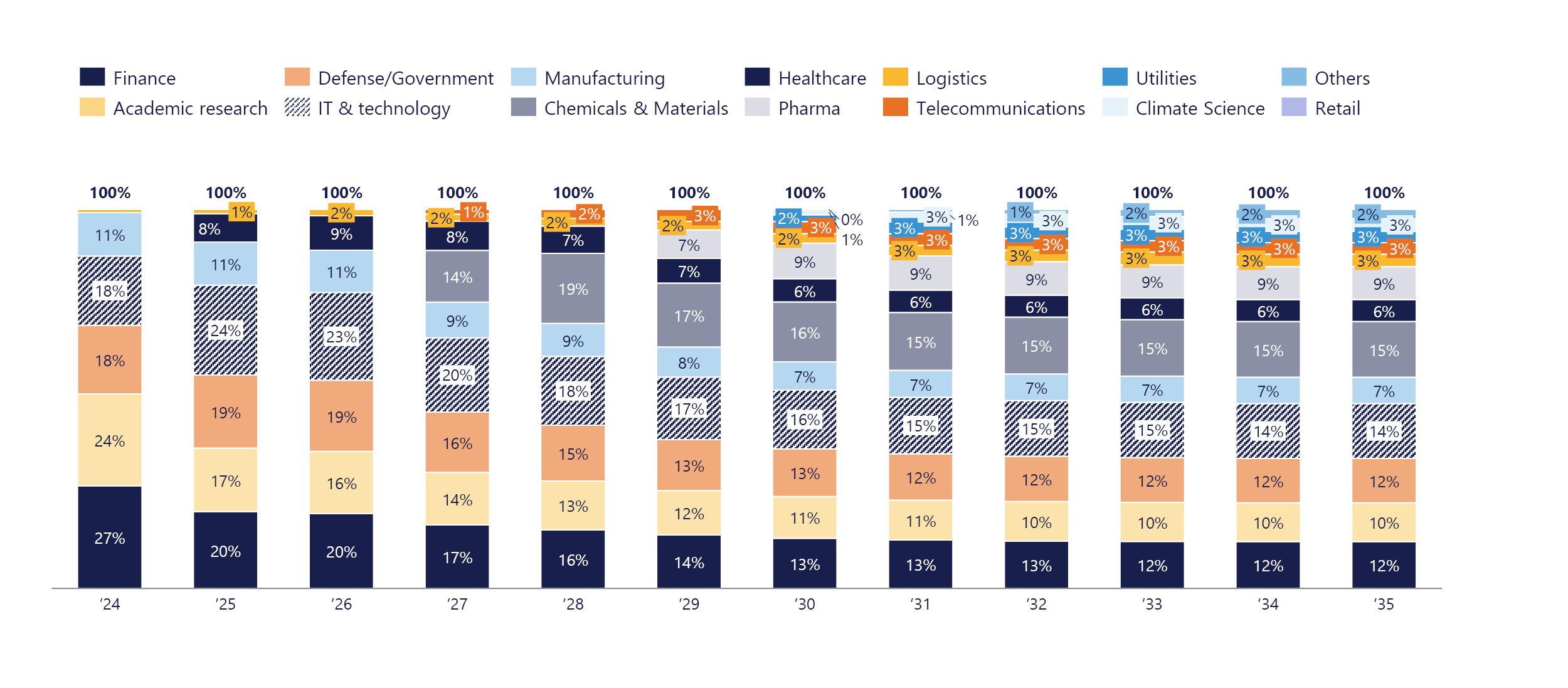INSIGHTS
Emerging Trends and Strategic Investments in Quantum Computing
Altman Solon is the largest global TMT consulting firm with expertise in telecommunications, media, and technology consulting. In the following insight, we offer predictions on the current trajectory of quantum computing and consider strategic implications that may unfold over the next few years.
Observations on the state of quantum computing (QC) today follow a trend similar to what we saw in the early stages of classical computing. Altman Solon has developed a proprietary forecasting model for potential QC adoption and revenues. This model, which has been validated by academics and executives in QC, provides a possible framework for identifying opportunities, managing risks, and aligning investment priorities with QC's phased development. Our model is based on the classical computing adoption curve, assuming critical milestones will be reached as engineering challenges are solved.
Barring any significant and unpredictable breakthroughs, our findings lead us to believe that the most viable QC investments will center on hardware and hardware providers. Moreover, we predict that in 2025, heralded as the "International Year of Quantum," investments will surpass 2024's $2 billion-plus to over $3 billion as the market continues to mature.
Overall, the market trajectory will rely heavily on investments in quantum-ready infrastructure, including advanced cooling systems and specialized data centers (DCs), ecosystem collaboration, and strategic positioning by hardware cloud players.
While there are still many engineering issues to solve, not the least of which is establishing cooling systems to enable hybrid classical-QC infrastructure, early adopters have emerged in defense, government, AI, and finance. Ironically, this data directly parallels the emergence of classical computing in the 1950s, leading us to believe that the past mirrors our future.
Early customers in finance, defense, AI, and government will likely use private, secure deployments.
We firmly believe that quantum computing will not fully replace classical computing anytime soon. We do, however, predict new hybrid classical-quantum algorithms gaining momentum in the next decade.
Investment implications
As funding in quantum computing increases, investors should focus on companies that can provide bespoke quantum solutions to specific verticals where the return on investment (ROI) is clear and evident, and sales are materializing.
Prioritizing companies with full-stack quantum capabilities or alignment with strategic ecosystem partners will solidify a position in the emerging market. The success of these players will hinge on their ability to either build out bespoke QC or hybrid deployments or form strategic partnerships with market-ready providers.
Hardware firms with clear pathways to scale or those capable of aligning with full-stack providers can ensure long-term competitiveness. Such firms are poised to become key players in the market and will gain value as the industry matures.
New entrants into the quantum hardware space have a viable pathway to success if they can prove scalability, with a likely exit through acquisition by an established player.
Going forward, hybrid QC/classical computing use cases are expected to dominate until scale becomes feasible. Companies focused on integrating quantum and classical computing, particularly in high-performance computing environments, are interesting and can potentially broaden use cases across verticals.
Quantum computing market revenue

Quantum computing market revenue

Investing in quantum-ready infrastructure
Investing in quantum-ready data centers and quantum-specific infrastructure will eventually enable the transition from bespoke deployments to scalable QC as a Service (QCaaS) models.
This transition will unlock further market opportunities as QC-native solutions evolve.
Though we view this as a long-range scenario, investors looking to act today should focus on companies with defensible positions or strong partnerships capable of withstanding pressures from the dominant cloud and high-performance computing players with historical classical expertise.
As QC will likely be cloud-based in its early years, digital infrastructure providers have a unique opportunity to shape the market. Investment here will enable them to influence early adoption and accelerate the ecosystem’s development.
Strategic positioning and collaborations
Strategic positioning by hardware cloud players will be crucial for fostering ecosystem collaboration and ensuring long-term market success. Companies that can position themselves within the ecosystem and collaborate effectively will be better equipped to handle market challenges and capitalize on emerging opportunities.
Moreover, ecosystem collaboration will be vital in developing and deploying QC solutions. Collaboration enables shared resources, knowledge, and expertise, leading to more robust and innovative solutions that strengthen the market as a whole.
Looking ahead
The future of quantum computing holds immense potential, with the possibility of rapid advancements and widespread adoption in the coming years. Like classical computing, early QC adoption will be limited to a few players, the very same who invested in classical computing during the 1950s: defense, governments, and finance.
At the same time, we can envision widespread adoption and significant innovation in QC over the next decade. Motivated investors should focus on companies with strong full-stack capabilities, strategic partnerships, and a clear pathway to scale in the emerging QC market.
Watch Partner Frederic Huet's discussion of investment opportunities in quantum computing.
Fill out the form below for our full report on emerging trends and strategic investments in quantum computing.
Thank you to Alexis Guiral for his contributions to this report.